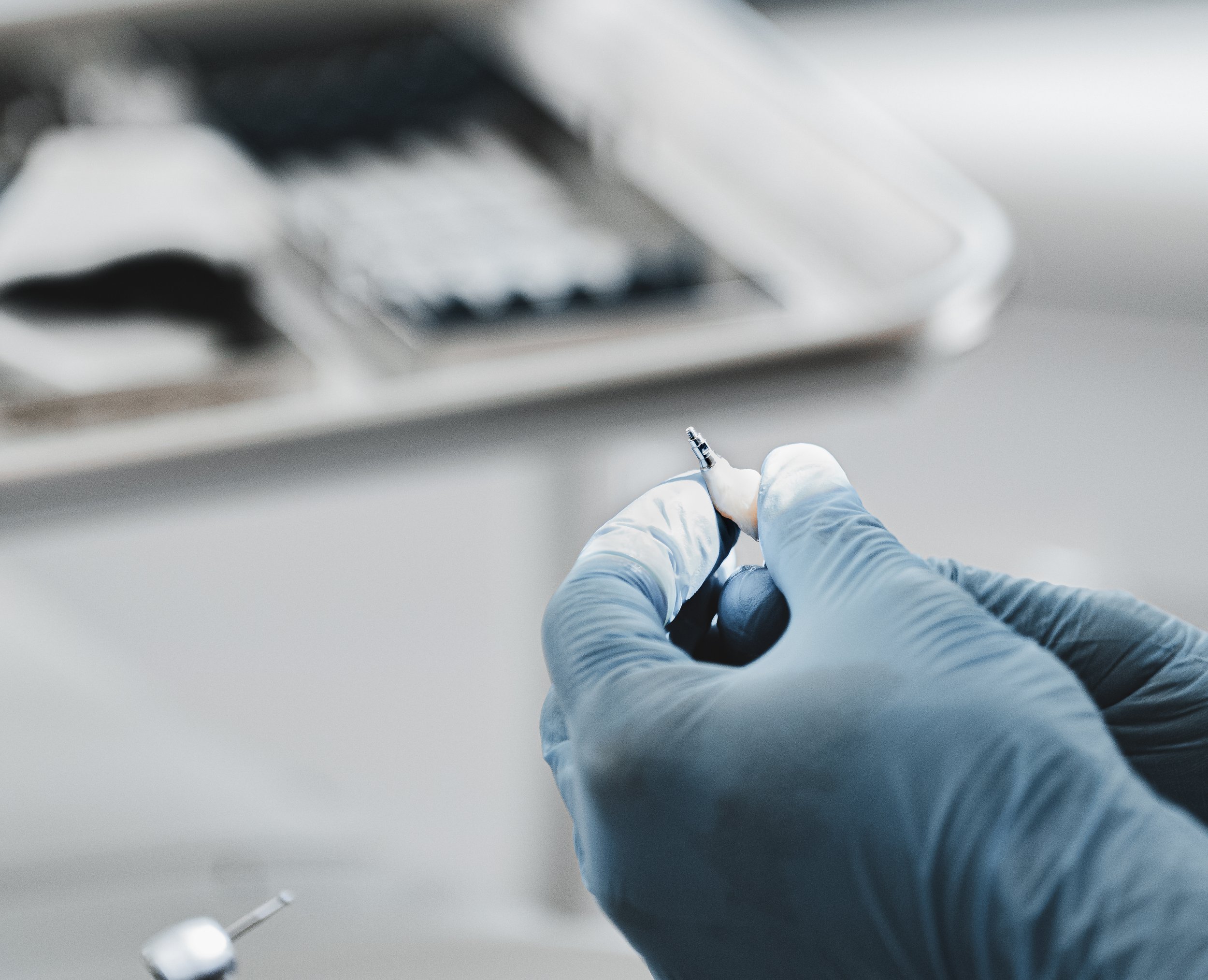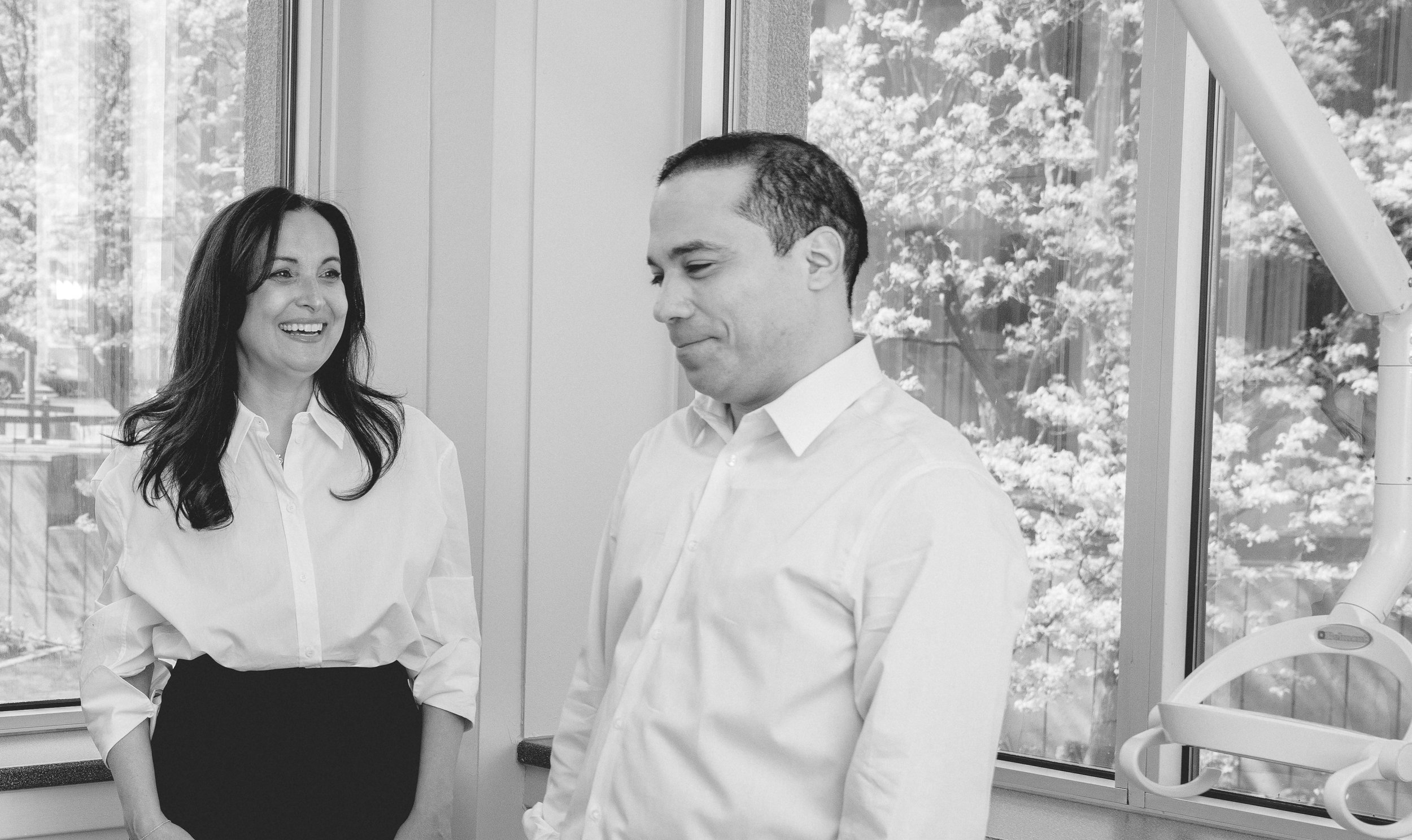
IMPLANTOLOGY
Experience the renewed pleasure of smiling confidently. Regardless of whether you are missing a single tooth or multiple teeth, dental implantology offers you the chance to relish the sensation of a flawless and complete smile once more.
DENTAL IMPLANTS AND FULL MOUTH REHABILITATION
A dental implant is a titanium screw-like structure that substitutes the root and is placed in your jaw to hold a replacement tooth, bridge, or denture in place. While high-tech in nature, dental implants are more tooth-saving than traditional bridgework since implants do not rely on neighbouring teeth for support.
Dental implants are also an affordable option. When comparing the cost of replacing a single tooth, an implant-retained crown is very often lower in cost than a 3-unit bridge. Also, healthy teeth are not being cut down for needed support and retention.
Dental implants are intimately connected with the gum tissues and underlying bone in the mouth. Since periodontists are dental experts who specialize precisely in these areas, they are ideal members of your dental implant team.
Dental implants offer a comprehensive solution for replacing missing teeth, enhancing not just the functionality of your mouth but also your overall quality of life. Their stability, natural appearance, and long-term benefits make them a highly sought-after option in modern dentistry.
BENEFITS OF DENTAL IMPLANTS
-
Dental implants are designed to mimic the strength and stability of natural teeth. They are anchored securely in the jawbone, providing a sturdy foundation that allows for normal biting and chewing, just like your original teeth.
-
Dental implants are often the treatment of choice for missing teeth due to their reliability and natural feel. Unlike dentures or bridges, implants do not require altering adjacent teeth, preserving more of your natural tooth structure.
-
With missing teeth or poor-fitting dentures, speech can often be affected, leading to mumbling or slurring of words. Dental implants allow you to speak freely and clearly, as they are securely anchored and do not slip.
-
Unlike removable dentures, which can cause discomfort and need regular adjustments, dental implants become a part of you. This integration with your jawbone means they feel much more comfortable and natural.
-
Chewing can be challenging with sliding dentures. Dental implants function like your own teeth, enabling you to eat your favorite foods with confidence and without discomfort.
-
Dental implants can significantly improve your quality of life. They look and feel natural, boosting your self-esteem and appearance. Additionally, implants don't require reducing other teeth, as a tooth-supported bridge does, preserving more of your natural teeth and improving long-term oral health.
-
Implants are very durable and can last many years. With good care, many implants last a lifetime, making them an excellent long-term investment for oral health.

COLLABORATION TO ESTABLISH AN EFFECTIVE TREATMENT PLAN
This procedure is a team effort between you, your dentist, and your periodontist. Depending on your specific condition and the type of implant chosen, Dr. Mancini, Dr. El Kholy, and Dr. Doliveux will create a treatment plan tailored to meet your needs.
FULL MOUTH ESTHETIC REHABILITATION
Full Mouth Esthetic Rehabilitation is a comprehensive treatment approach designed for individuals with severely advanced periodontal disease and significant tooth loss.
This method combines the effectiveness of periodontal therapy and strategic implant placement to restore not just the health and function of the mouth but also its aesthetic appearance.
In situations where retaining the natural teeth is not feasible as a support structure for prosthetic treatments, or in cases where a patient is already without teeth and wishes to transition from a removable to a fixed prosthesis, Full Mouth Esthetic Rehabilitation provides an effective solution. The process involves the careful insertion of an appropriate number of dental implants to support full arches.
This method of rehabilitation is particularly beneficial as it offers a stable, long-lasting solution, greatly enhancing the patient's quality of life. Not only does it improve oral functionality, allowing for comfortable eating and speaking, but it also dramatically improves the aesthetic aspect of the smile, boosting self-confidence and overall well-being.
-
The solution can be both simple and effective: a single dental implant paired with a crown. This approach involves inserting an implant into the jawbone at the site of the missing tooth. Once the implant integrates with the bone, a crown is placed on top, effectively replacing the tooth both functionally and aesthetically. This method not only looks and feels like a natural tooth but also preserves jawbone health and maintains the alignment of surrounding teeth.
-
Implant-supported bridges offer a reliable replacement option. Unlike traditional bridges that rely on adjacent teeth for support, implant-supported bridges are anchored by implants placed in the jawbone. This method is beneficial as it doesn't stress the neighboring teeth and maintains jawbone integrity, while effectively restoring the function and appearance of the missing teeth segment.
-
An implant-supported full bridge or full denture provides a comprehensive solution. This procedure involves placing multiple implants in the jawbone to support an entire arch of teeth. The result is a full set of teeth that are securely anchored and do not require the use of adhesives. This option not only restores the full functionality of the teeth but also preserves facial structure and jawbone health, offering a more permanent and comfortable solution than traditional dentures.

Recomendations
DENTAL IMPLANT MAINTENANCE
Dental implants, much like natural teeth, demand consistent and thorough care to maintain their health and longevity. It's essential to treat them with the same diligence you would your teeth.
This means adhering to a rigorous oral hygiene routine that includes regular brushing and flossing. Brushing effectively removes plaque and food particles from the surface of the implants and surrounding gums, while flossing is crucial for cleaning the spaces between the teeth and implants, preventing the buildup of plaque and the development of gum diseases.
Post-treatment care is a collaborative effort. Your periodontist will play a key role in guiding you through the care process, working in conjunction with your regular dentist to tailor a care plan that suits your specific needs. This personalized plan is not just about maintaining the implants; it also focuses on the overall health of your teeth and gums.
Regular follow-up visits are a critical component of this care plan. These periodic check-ups allow your periodontist to closely monitor the condition of your implants, teeth, and gums.
During these visits, your periodontist can assess the stability and integration of the implants, check for signs of gum disease or implant failure, and make adjustments to your care plan as needed.
These visits are also an opportunity for professional cleanings and to provide you with feedback and advice on your oral hygiene practices, ensuring the long-term success of your dental implants and the health of your oral environment.


